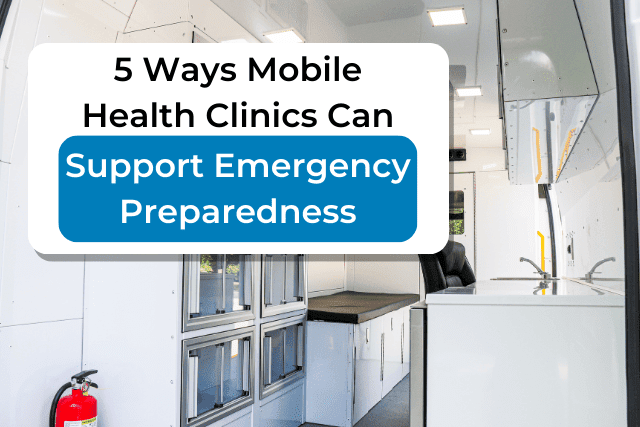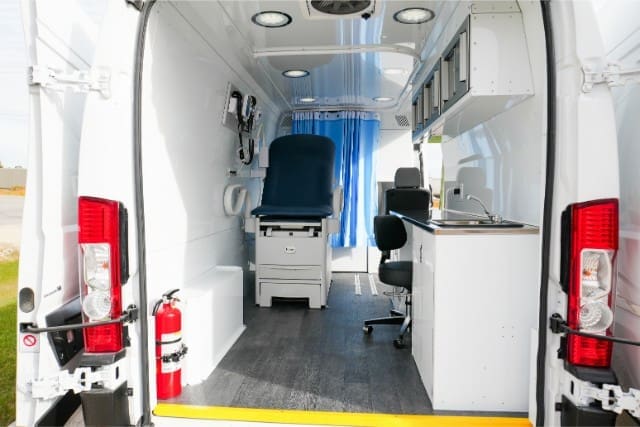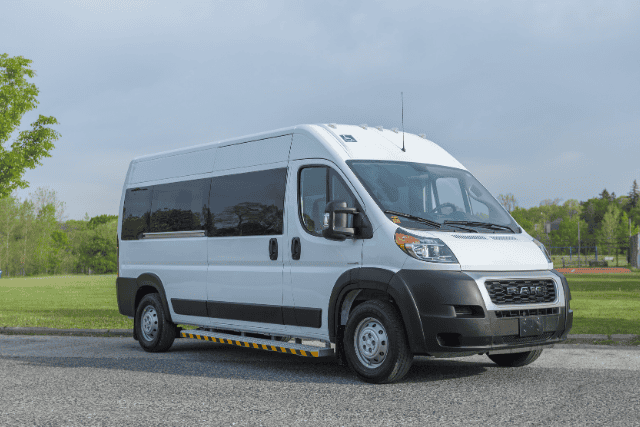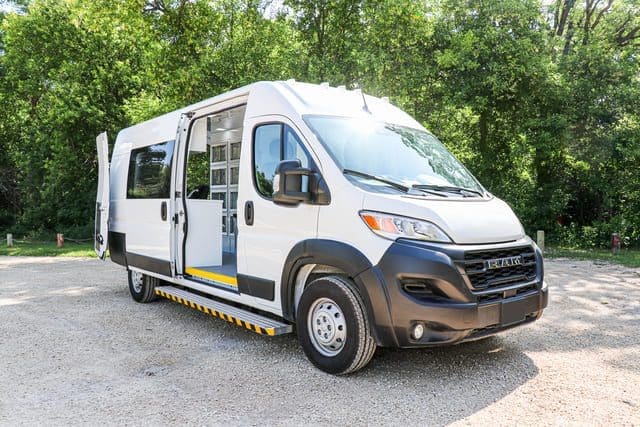Did you know there have been almost 400 natural disasters in the U.S. over the last 45 years? Hurricanes, wildfires, pandemics—when these events hit, healthcare systems can struggle to keep up. Emergency preparedness is probably on your mind if your organization provides care during crises.
You’ve likely asked yourself, How do we keep serving people when disaster strikes? It’s a heavy responsibility, and without the right action plan, the people depending on you could go without the care they need the most, leading to:
- Overwhelmed healthcare systems
- Lack of access to care
- Increased loss of life
It’s frustrating trying to figure out how to prepare for the unexpected—and the last thing you want is to be caught off guard when it matters most.
That’s where mobile health clinics step in. These units bring care right to the people who need it—no waiting, no barriers. When hospitals are overwhelmed or access to healthcare is cut off, mobile medical units can step in and fill that gap, ensuring no one gets left behind. That means:
- Seamless access to healthcare
- Lives saved through quick action
- Less strain on emergency rooms
At AVAN Mobility, we’ve spent over 10 years helping organizations like yours bridge those gaps with mobile health units. We understand the challenges you’re facing because we’ve seen them firsthand. While we know we’re not the only manufacturer out there, our decade of experience has taught us what works and how to help you make the right decisions for your community.
In this article, you’ll discover five ways mobile health clinics can support emergency preparedness. Let’s dive in and explore how they can become a big part of your plan to stay prepared and protect lives.
How can mobile health clinics support emergency preparedness?
Mobile health clinics are a strong solution to address many of the issues that creep up in emergencies. Let’s look at five ways they help with emergency preparedness.
1. Mobile health clinics step in when hospitals can’t
When Hurricane Katrina hit New Orleans, hospitals were flooded, damaged, or packed with people. The Veterans Administration Medical Center and Charity Hospital were evacuated. Many had no way to get the care they needed.
Fixed healthcare facilities can become hard to reach and run the risk of shutting down completely when disasters like this happen. This leaves communities without care when they need it most. That’s when mobile health clinics step up. These clinics can go where they’re needed and help people get the care they can’t wait for.
Here’s how mobile clinics make a difference when hospitals aren’t an option:
Quick to respond: If a hospital shuts down, mobile clinics are ready to help immediately.
Easy to reach: They park at schools, shelters, or parking lots, so people can get care close by.
Help with all kinds of needs: From giving vaccines to treating cuts, mobile clinics make sure small problems don’t turn into emergencies.
2. Mobile health clinics reduce pressure on crowded hospitals
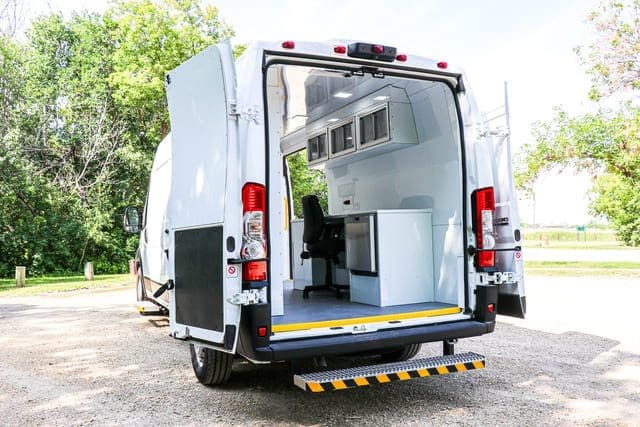
Picture a wildfire spreading through a community. Emergency rooms quickly fill with people—some with serious injuries, others struggling with smoke inhalation or panic attacks. When too many patients show up at once, hospitals can get overwhelmed, making it harder for everyone to get care.
This is where mobile health clinics come in. These mobile medical units can handle non-urgent care right on the spot, giving hospitals the space they need to focus on life-threatening emergencies.
Here’s how mobile health units make a difference:
Provide fast care: They treat minor injuries or illnesses, keeping people out of overcrowded ERs.
Offer specialized services: Some mobile units focus on mental health, helping people cope with anxiety or trauma after a disaster.
Set up where needed: These clinics can park at shelters or community centers, making it easier for people to get help.
Mobile health clinics play a big role in emergency preparedness by making sure everyone gets the care they need. This helps keep local hospitals from getting overwhelmed. When things get tough, these mobile units help the system run smoothly.
3. Mobile health clinics keep preventive care going during emergencies
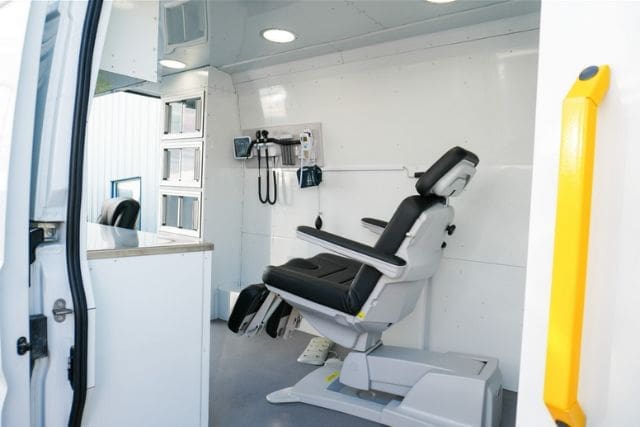
In emergencies like hurricanes or floods, people often think about treating injuries. But for someone with diabetes, heart disease, or other chronic conditions, missing regular care can be just as dangerous.
Mobile health clinics help by making sure these patients get the care they need, even when hospitals or clinics are shut down or hard to reach.
Here’s how mobile health clinics keep care on track:
Provide medications: Mobile units bring refills for prescriptions, insulin, or other treatments patients rely on.
Help avoid emergencies: Regular check-ups keep chronic conditions under control, preventing trips to the ER.
Stay connected with patients: Mobile clinics set up close to communities, so patients don’t lose touch with their healthcare providers.
It’s easy to forget about the people who need preventive care during huge emergencies. As you can see, an important part of emergency preparedness is about keeping care going, even during emergencies.
4. Mobile health clinics bring mental health care when people need it most
During emergencies and crises, it’s not just the physical damage that hurts people. Stress, anxiety, and trauma can be overwhelming, and finding help isn’t always easy when clinics are closed or packed.
This is where mobile health clinics make a big difference—they bring mental health care to the people who need it.
Here’s how mobile medical units help with mental health during emergencies:
On-the-spot support: Mental health professionals travel with the clinic, giving immediate care to people feeling overwhelmed.
Group sessions nearby: These units set up at shelters or community centers, making it easy to join group therapy and heal together.
Private and easy access: People can talk to someone in a safe, private space without worrying about judgment or long trips to a clinic.
Mobile health units make sure emotional support is part of emergency preparedness. When people get the help they need, they can start feeling better and move forward, even during tough times.
5. Mobile health clinics bring care to remote areas during disasters

Sometimes, roads can get blocked off by debris during natural disasters, and rural areas can be cut off from hospitals. This makes it exceptionally hard for people to travel for healthcare.
Because mobile health clinics aren’t limited to a fixed location, they can help by bringing medical services directly to these remote communities, or at least as close as they can get.
Here’s how mobile units help in remote areas:
Reach isolated places: Mobile clinics can drive into hard-to-reach areas and provide care where it’s needed.
Offer basic care: They treat minor injuries, give vaccines, or do check-ups, so people don’t have to wait for hospitals to open.
Respond quickly: Mobile units can start helping within hours, getting care to people while other services catch up.
When traditional healthcare isn’t available, mobile health units make sure people in remote areas still get the care they need. No one is left behind, no matter how far they live from a hospital.
Learn how your organization can support emergency preparedness with a mobile health clinic
You came to this article to learn how mobile health clinics can play a big role in emergency preparedness. If you’ve made it this far, you now know that they can:
- Provide healthcare when hospitals are shut down
- Reduce crowding in hospitals
- Ensure preventive care is continued
- Help with mental health needs
- Bring care to remote communities
At AVAN Mobility, we manufacture mobile medical units so organizations like yours can overcome barriers to healthcare, just like the ones we’ve discussed. If you have any questions about anything in this article, feel free to click the button below to talk to a helpful mobility expert.
Are you not ready to talk to someone yet? We have a couple of other resources you may find helpful.
Start with checking out our article on the 10 steps to starting a mobile medical clinic. This will give you some more guidance on how to proceed with your mobile medical journey.
In this article, we’ve talked a bit about standard hospitals. Read our article on standard hospitals vs. mobile clinics to learn more about their differences and to give you a better idea of what mobile health clinics are capable of.
